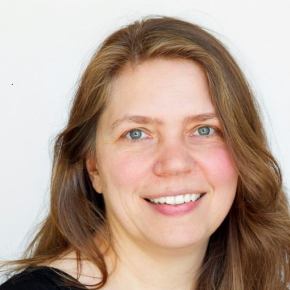The CNRS Institute of Chemistry welcomes Martina Stenzel as the Ambassador in Chemical Sciences
On November 27 2023, Martina Stenzel, Professor in the School of Chemistry of the University of New South Wales, Sydney, will start a series of lectures in several French CNRS laboratories as the Ambassador in Chemical Sciences in France. Professor Stenzel’s research focusses on macromolecular chemistry and how to synthesize complex (bio)polymers and sugar coated nanoparticles for drug delivery. She tells us all about these smart biomimetic vessels.
You navigate from complex polymer architectures to drug delivery devices. What drove you into this research field?
Polymers have fascinated me ever since I first heard about them at school. These long macromolecular chains made of repeating building units, the monomers, can present a wide range of physico-chemical and mechanical properties. And if you combine 2 or 3 blocks of different monomers within the same chain, the final material’s behaviour is even more complex. No other material offers such versatility! I therefore chose polymers as a topic for my PhD where I developed membranes for gas separation. It’s only when I started working as a postdoc at the University of New South Wales that I discovered the use of polymers for biological applications. As the Australian research environment fosters collaborations, I was approached early in my academic career by biomedical engineers who needed some polymers. At this time, I focused on the synthesis of different polymer architectures without a specific application in mind. This new collaboration was an opportunity for me to discover a completely new world at the interface between polymers and biology. Nanoparticles for drug delivery particularly interested me. These nanoparticles are quickly internalised by cancer cells and I am still amazed by how one can fine-tune their biological activity by playing with the underpinning polymer structure.
What future outcomes do you expect in the next 5 to 10 years for polymers in therapeutics?
Nanomedicine had a slow start. A lot of money was indeed poured in this research field over the past 20 years and only a few products emerged on the market. Yet, I believe that all this research is finally paying off and that we will see more clinical products emerging on the market. Just think about the Covid vaccines: the nanoparticles used to deliver mRNA have been available for a while as the first patent was filed in 1991. It just needed an emergency, a global crisis, to push this drug delivery system through the market. Of course, this was an extraordinary scenario and it can take usually many, many years to get a therapeutic product on the market. While the field is dominated by nanoparticles for cancer therapy, we can expect to see more nanoparticles being approved for other diseases. However, this is not the time to be complacent! There are still a lot of challenges that can only be tackled using a holistic approach of interdisciplinary teams including researchers from all fields, industry, government bodies and the end-user.
As a CNRS ambassador of Chemical Sciences, what are you most looking forward to during your French conference tour?
I am looking forward to a range of things. I have known many of my French colleagues for many years now and I am looking forward to visiting them in their own Universities, a little bit like visiting somebody’s home. Over the years, I had several postdocs from France, who have now their own academic positions. I am also curious to learn more about the current research of my hosts, maybe I even get the opportunity to talk to some of their students. It is always interesting to compare how research is carried out in other countries.
Confeference tour:
- 27/11/2023 - Paris - Patrice Castignolles - Institut parisien de chimie moléculaire
- 28/11/2023 - Paris-Saclay - Julien Nicolas - Institut Galien Paris-Saclay
- 29/11/2023 - Lyon - Muriel Lansalot - Laboratoire Catalyse, Polymérisation, Procédés et Matériaux (CP2M) et Julien Bernard, Laboratoire Ingénierie des Matériaux Polymères (IMP)
- 30/11/2023 - Marseilles - Didier Gigmes - Institut de chimie radicalaire
- 1/12/2023 - Montpellier - Patrick Lacroix-Desmazes - Institut Charles Gerhardt Montpellier
- 4/12/2023 - Pau - Maud Save - Institut des sciences analytiques et de physico-chimie pour l'environnement et les matériaux
- 6/12/2023 - Toulouse - Mathias Destarac - laboratoire Softmat - Chimie des colloïdes, polymères & assemblages complexes
- 7/12/2023 - Bordeaux - Sébastien Lecommandoux - Laboratoire de chimie des polymères organiques
- 8/12/2023 - Paris - Renaud Nicoläy - laboratoire Chimie moléculaire, macromoléculaire, matériaux
